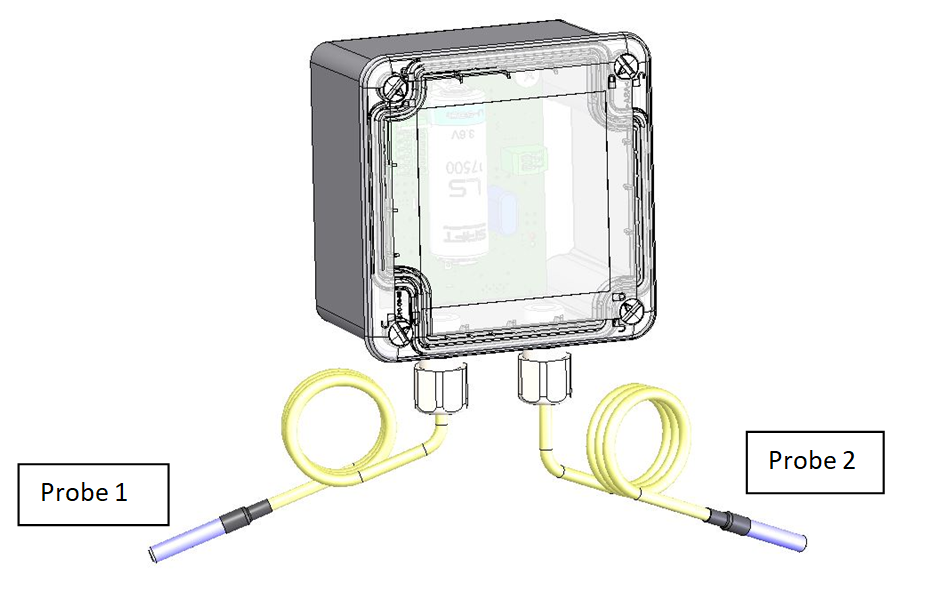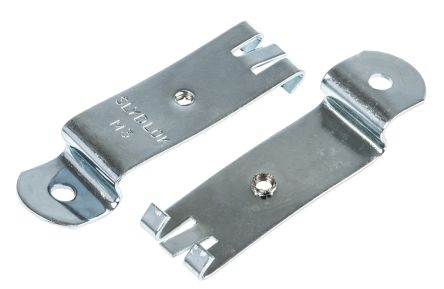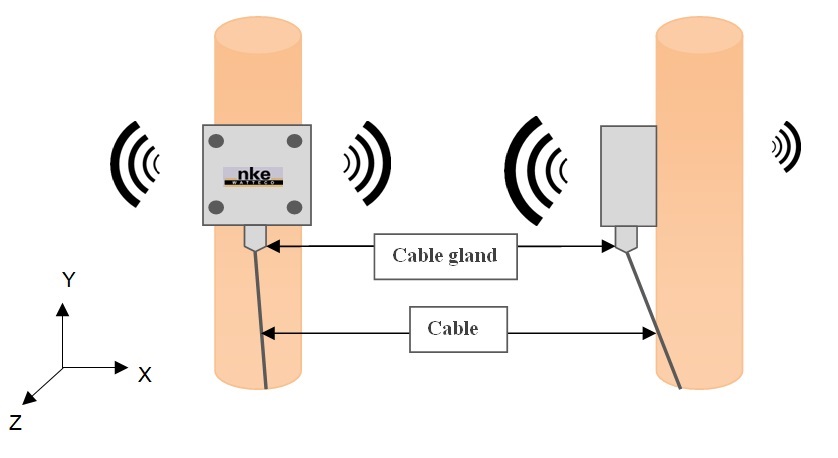Remote temperature 2 sensors
Declaration of conformity
Download the declaration of conformity
Presentation
The Remote temperature 2 sensors is a LoRaWAN class A sensor that integrates an internal on the battery. It also incorporates an internal antenna.
The sensor includes two 2-meters temperature probe.

The Remote temperature 2 sensors allows the measurement of temperature over a wide range of values. It can measure from -40°C to +90°C with a precision of 1°C.
The table below shows the precision for each range of temperatures:
| Temperature range | Precision |
|---|---|
| [-40°C ; -34°C] | +/-1.5°C |
| [-33°C ; +9°C] | +/-1.0°C |
| [+10°C ; +37°C] | +/-0.5°C |
| [+38°C ; +64°C] | +/-1.0°C |
| [+65°C ; +82°C] | +/-1.5°C |
| [+83°C ; +90°C] | +/-2.0°C |
The measurement step is defined in the minimum field of a frame.
The housing is compatible with the following DIN rail adapter:
For more information about the casing, please visit: www.spelsberg.com
Family code:
The family code of Remote temperature 2 sensors devices is: 50-70-139-xxx
Radio propagation
In order for the sensor to operate correctly, the number of obstacles should be limited in order to avoid excessive radio wave attenuation. It is also important to place the sensor as high as possible. The cable gland should be positioned downward.
Autonomy
The information in the table below represents how long the battery can last. It is based on the default configuration at ambient temperature (+25°C) within the optimal operating range of the sensor via a LoRaWAN network (one uplink frame), when the spreading factor used is SF12.
The disposable battery has a 3.6Ah capacity, of which 85% is used.
| Transmission periodicity | Battery life |
|---|---|
| 1 frame/ 2 hours | 12 years |
Human Machine Interface
The Remote temperature sensor has a buzzer that allows it to “communicate” with the user.
A reed switch is available under the sticker. It is possible to use a magnet to activate it and makes specific actions on the sensor (Switch off, switch on, Re-associtation…). When the reed switch is activated, the buzzer rings quickly.
To Start-up the device, it is necessary to put a magnet on the side of the sensor during one second (at the left side of the cable gland). The buzzer rings quickly during this step. After this second, the buzzer stops and rings slowly until the association is done.
To switch off the device, use the same way by putting the magnet during 5 seconds. After this amount of time, the device rings 5 times slowly.
The table below describes the actions to be performed on the reed switch to disable or enable the storage mode.
| Switch ON (disable storage mode) | 1 second | |
| Switch OFF (enable storage mode) | 5 seconds |
When the sensor is trying to associate with a network, it emits the following sound:
Once the association is completed, the buzzer makes the following sound:
A reed switch (or magnetic switch) is available. A magnet can be used to activate it and perform specific actions on the sensor (configuration, reassociation…).
- Configuration: "void" frames are sent every minute for 10 minutes.
Standard reports are disabled in this mode.
| Way to trigger it | One passage of the magnet near the reed switch or specific ZCL command |
| Way to stop it | Another passage of the magnet or specific ZCL command |
| Effects on the sensor | |
| Duration | The configuration mode lasts 10 minutes |
- A reassociation procedure can be requested if no downlink frame is received by the sensor during a given periodicity (4 days by default) or if a given number (100 by default) is reached or in case of failure (no acknowledgement received) by sending an applicative frame to the sensor or via the sensor’s IHM.
The sensor keeps the AppEUi and DevAddr configured, Confirmed/Unconfirmed configuration and all applicative configurations. However, LoRaWAN configurations (channel, data rate…) are lost.
| Way to trigger it | Three passages of the magnet near the reed switch or ZCL command from LoRaWAN cluster. |
| Effects on the sensor | |
- A factory reset is available on Watteco’s sensors. It deletes all the applicative settings saved in the flash memory (i.e. configured batches and reports will be deleted).
The sensor keeps the AppEUi and DevAddr configured. However, LoRaWAN configurations (channel, data rate…) and applicative configurations are lost.
| Way to trigger it | Two quick passages and a very long passage (until the sensor rings for the reset) of the magnet near the reed switch |
| Effects on the sensor | |
Applicative layer
Codecs are available to decode frames: Downloads
The Remote temperature 2 sensors integrates the following clusters:
| Cluster | Cluster name | Managed attributes |
|---|---|---|
| 0x0000 | Basic | All |
| 0x0050 | Configuration | All |
| 0x8004 | LoRaWAN | All |
| 0x0402 | Temperature Measurement | All |
Probe 1 is on the EndPoint 0 / Probe 2 is on the EndPoint 1
Default configuration
A default configuration is set:
- The device reports a "batch" of temperature from probe 1 and probe 2 every 1 hour with a measure all 10 minutes.
The configuration of batch is :
| Features | Label (size= 3) | Measure periodicity | Transmission periodicity | resolution |
| Temperature 1 (probe 1) | 0 | 10 minutes | 1 hour | 0.1°C |
| Temperature 2 (probe 2) | 1 | 10 minutes | 1 hour | 1% |
| Battery Voltage | 5 | 24 hours | 24 hours | 100mV |
Every change made to the default configuration must comply with the legal duty cycle (for example, the most restrictive in the EU is 0.1%, which corresponds to approximately 1 frame per hour with SF12)
To decode the default "batch" is necessary to use this argument: 3 0,10,7 1,10,7 5,100,6 .
Measurement periodicity
The measurement periodicity depends on the minimum and maximum recording intervals, and the delta.
If the value of the minimum and the delta is 0, then the maximum value is the periodicity. However, if the value of delta is different than 0, then the periodicity is 1 second.
If the value of the minimum is different than 0, then this value is the same as the periodicity.
Frame examples
All frames have to be sent on port 125
Standard report
Report
Report of the temperature of the remote sensor → Applicative payload is: 11 0a 04 02 00 00 29 00 64 00 64: Measured value 1°C (Temperature (°C) = Measured value/100)
Configuration
Configure a standard report on the temperature Report immediately the temperature for every 11°C of variation. This measurement has to be reported at least every hour. →The temperature is on the EndPoint 0, Cluster “Temperature Measurement” is 0x0402, Attribute “MeasuredValue” is 0x0000. The maximum field has to be 0x0e10 to have a report every one hour and the minimum field has to be 0x0000 to have a report immediately after the right variation. The delta has to be configured to 1100=0x044c for a report every 11°C of variation. Applicative payload is: 11 06 04 02 00 00 00 29 00 1e 0e 10 04 4c 00 1e:minimum reporting interval (30 seconds) 0e 10: maximum reporting interval (1 hour) 04 4c: reportable change (11°C) →Response: 11 07 04 02 00 00 00 00 To disable the previous configuration, change the value of the minimum and maximum sending intervals and the delta to 0: 11 06 04 02 00 00 00 29 00 00 00 00 00 00
Batch report
→ Applicative payload is: 22050010355c04b3c89e800e0c20005901c80a405600b2029085244992ea743800
with the "batch" codec and the argument 3 0,10,7 1,10,7 5,100,6 the result of this is :
{



